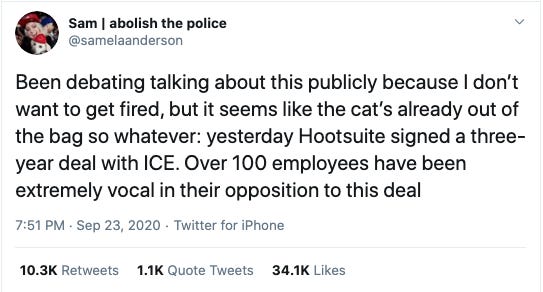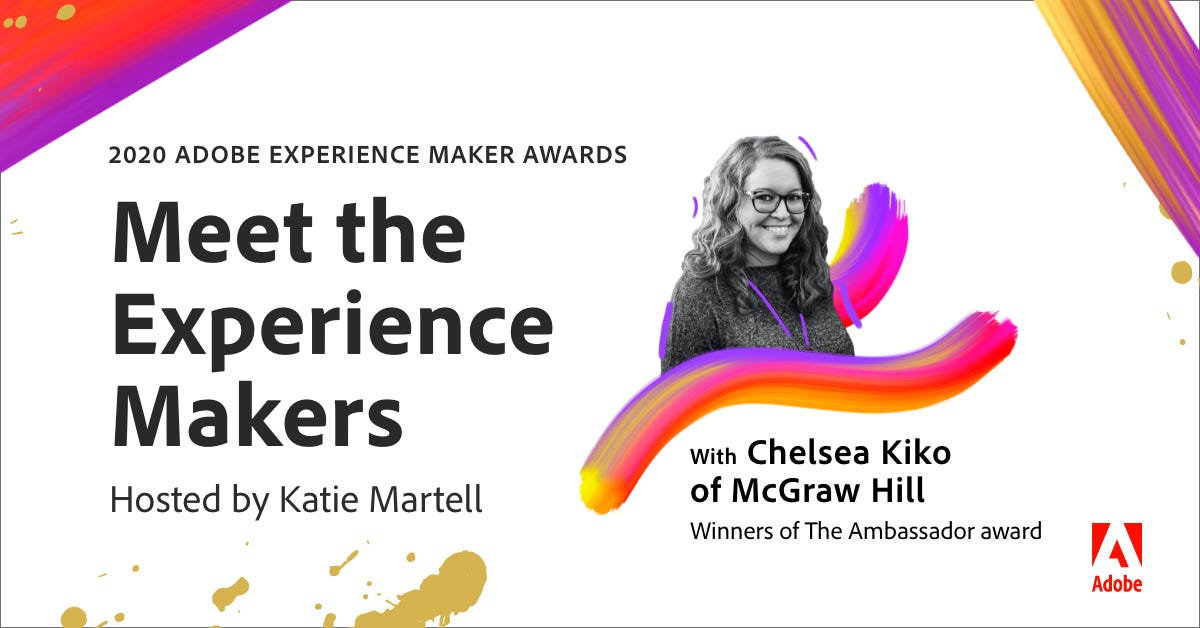#145: "As addictive as cigarettes," spotting trolls, a limit to outrage, Hootsuite's deal, and a caring type of B2B hustle
This week's newsletter is hot and fresh
Happy Friday.

In this week’s edition of The World’s Best Newsletter:
How Facebook was built to be as addictive as cigarettes
Hootsuite and ICE
We don’t have enough outrage for both Breonna Taylor and RBG
Can you spot the troll?
A “caring type of hustle”
Curious people wonder
Quote of the week: Different.
Listen to the podcast version here.
1. How Facebook was built to be as addictive as cigarettes
Tim Kendall, Facebook's first Director of Monetization testified before the House Consumer Protection and Commerce Subcommittee this week claiming to have intentionally made the product as addictive as cigarettes. Read his comments.
3 ways the platform pulled from Big Tobacco’s addictive playbook:
Like adding sugar and menthol to cigarettes, Facebook added status updates, photo tagging, and likes, making status and reputation primary.
Big Tobacco’s bronchodilators (allowing cigarette smoke to cover more surface area of the lungs) is like Facebook allowing misinformation, conspiracy theories, and fake news to flourish.
Tobacco companies added ammonia to cigarettes to increase the speed of nicotine to the brain, like Facebook’s extreme, incendiary content— shocking images, graphic videos, and headlines that incite outrage— sowing tribalism and division.
Social media preys on the most primal parts of your brain. The algorithm maximizes your attention by hitting you repeatedly with content that triggers your strongest emotions— it aims to provoke, shock, and enrage.
When you see something you agree with, you feel compelled to defend it. When you see something you don’t agree with, you feel compelled to attack it. People on the other side of the issue have the same impulses.
The cycle continues with the algorithm in the middle happily dealing arms to both sides in an endless war of words and misinformation.
These algorithms have brought out the worst in us. They’ve literally rewired our brains so that we’re detached from reality and immersed in tribalism. This is not by accident. It’s an algorithmically optimized playbook to maximize user attention -- and profits.
If you, or someone you love, uses Facebook, check out his full comments.
To be clear, social media is not the root cause of every problem we’re facing. But I believe it may be the most powerful accelerant in history.
2. Hootsuite and ICE
Two days ago, a Hootsuite employee tweeted:

The employees were opposed to this deal due to:
“ICE’s repeated human rights violations at odds with our publicly stated values around DE&I, the Movement for Black Lives, and our purpose to champion the power of human connection.”
Related: The Troubling State of Medical Care in ICE Detention
“We’re a B corp, for f*ck’s sake” (What’s a B Corp? “Businesses that meet the highest standards of verified social and environmental performance, public transparency, and legal accountability to balance profit and purpose.”)
Hootsuite initially denied providing access to their social media technology, saying to a reporter at BIV:
“I can confirm that Hootsuite is not entering into a deal with U.S. Immigration and Customs Enforcement.”
Once the literal receipts - an invoice tracking the deal through an intermediary - were made public, the company announced they would back out of the $500k deal, making clear that the attention around the case was the motivating factor:
“We typically do not make public facing statements about specific customers or contracts. However, due to the attention around this particular case we can confirm that Hootsuite has decided not to do business with the U.S. Immigrations and Customs Enforcement.”
Some takeaways here:
Values are not window dressing, they are lived and experienced. Today, they’re part of the consideration set for buyers and employees alike
Employee activism is rising, enabled by social media, and should be taken seriously. Not to say employers should MUTE their teams (good luck) but rather ask if decisions like this run counter to the stated values of the organization that attracted those employees to begin with.
Don’t mess with accountability advocates. (Follow Nandini as this story evolves in real time.)
3. We don’t have enough outrage for both Breonna Taylor and RBG
There is a limit to the amount of outrage, grief and support one person can give.
This week, a friend commented that they were so upset about the passing of RBG that they were too exhausted to react properly a couple of days later when the insulting verdict of Breonna Taylor’s case was announced.
I found this 2017 resource helpful to this notion of outrage burnout.
“How to #StayOutraged Without Losing Your Mind”
Another important caveat is that you shouldn’t actively undermine other people’s issues. Just because you aren’t personally excited about something doesn’t mean it’s not important. The only way this works is if lots of people focus on lots of different issues, with the result that all the important stuff gets covered. So don’t be in the business of trying to convince people to switch their allegiance from one issue to another. Don’t tell people to stop talking about racism because climate change is more important, or that health care can wait because we have to focus on LGBTQ rights. It’s all important.
Read the full piece for more on self-care lessons like:
Focus your energy on one or two issues
Make activism fun “you don’t have to suffer to make a difference”
Take care of the basics (sleep, therapy, eat well, exercise)
Fill your cup so you have some left to give.
4. Can you spot the troll?
WAIT — bookmark this!!
I mean it.
Take this quiz. (h/t Stephan!)
You’ll examine real social media content and decide whether it’s a from a legitimate account or an internet troll.
I FAILED. Big time.
I sucked at this and I have literally given talks about weaponized social media!
The quiz from The Clemson University Media Forensics Hub underlines the effectiveness of modern disinformation and propaganda on social channels.

Take the quiz.
Do it.
—-

5. A “caring type of hustle”
In partnership with Adobe Experience Cloud
Chelsea Kiko embodies the mantra "you only get what you give." That's what made her this year's Ambassador in the Adobe Experience Maker Awards.
Find out how she did it - and lessons for all MOPs and CX teams.

6. Curious people wonder
In partnership with Rockwell Automation
“Don’t let anyone rob you of your imagination, your creativity, or your curiosity. It’s your place in the world; it’s your life. Go on and do all you can with it, and make it the life you want to live.” - Dr. Mae Jemison, the first black woman in space
This quote is from Dr. Mae Jemison, the first black woman to travel into space as a crew member of the Endeavour in 1992.
Her take on curiosity is timeless, but poignant in 2020.
I can think of no better mantra for the colossal shifts that have forced all of us to re-think what “normal” really is than one that embraces intentional creativity and curiosity.
Every business is faced with a choice this year: reinvent and adapt, or stall.
One organization who takes this to heart is Rockwell Automation, a leader in industrial automation. I was delighted to be part of their campaign, Curious People Wonder, an effort to shine a light on the power curiosity has to bring fresh perspectives and new thinking to ourselves, and the organizations we work for.
7. Quote of the week:
“We are different. We are one.”
Derrick Wang’s opera about the relationship between Justices Ruth Bader Ginsburg and Antonin Scalia is centered around this common thread.
Toward the end of the opera, tenor Scalia and soprano Ginsburg sing a duet: “We are different, we are one,” different in our interpretation of written texts, one in our reverence for the Constitution and the institution we serve.
—-
I hope you have a great weekend ahead.
Best,
Katie
-
Katie Martell
Next week:

Join me next Friday, October 2nd at 11am ET for a discussion with management and leadership consultant Dr. Nika White on brands pandering to social movements. Registration is free.



